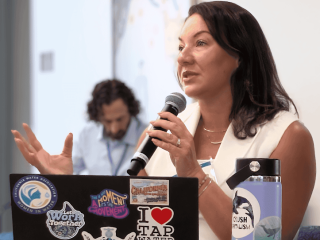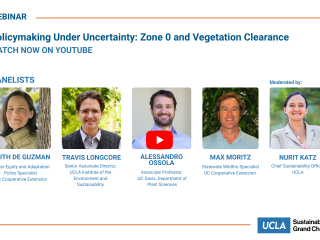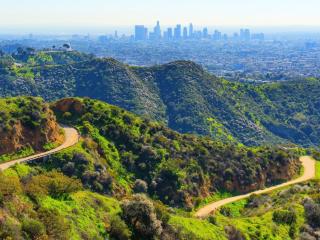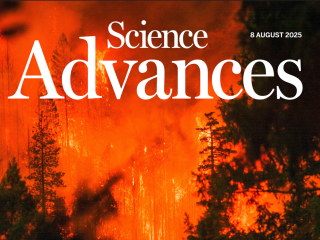As urban wildfires become more frequent and severe, what role can water systems realistically play in protecting lives, supporting emergency response, and guiding resilient rebuilding? A new report from the Luskin Center for Innovation, Water Systems’ Wildfire Fighting Capacities and Expectations, begins to answer this question. The report synthesizes the findings and discussion from a convening of more than 50 experts convened through the UCLA-UCANR Water Supply + Wildfire Research and Policy Coordination Network to tackle these critical questions.
News
Watch the the first in a series of webinar discussions on defensible space that SLAGC is organizing. During Policymaking Under Uncertainty: Zone 0 and Vegetation Clearance, experts discussed what is and—crucially—what isn't known about the role vegetation plays in fire spread. Read more.
SLAGC brought together dozens of UCLA experts from across disciplines to discuss their research related to the 2025 LA fires, their impacts, and recovery efforts over the course of three lunch dialogue events in October. Read more and watch videos of the experts discussing their work.
SLAGC concluded the series of lunch dialogues on October 23 with another group of six researchers covering a range of topics, including an overview of UCLA’s mental and physical health research related to the fires to soil health, smoke and air quality impacts on people, and effects of the fires on marine life. Read more.
Following up on the October 2 event, SLAGC curated another, equally diverse range of experts to present at the October 10 lunch. Some of the presentations built on the topics of the previous event—like the role urban trees played in the dynamics of fire spread in January 2025—while others introduced new topics, like the impact of the fires on education and service access of children in foster care. Read more.
A report released today by UCLA—in partnership with LADWP—identifies four areas critical to strengthening water and power infrastructure to reduce risks and improve reliability as climate-related disasters intensify. It details important findings from an intensive June 9 workshop—commissioned by LADWP and developed, organized and hosted by UCLA Luskin Center for Innovation with programmatic and logistical support from the Sustainable LA Grand Challenge (SLAGC)—that brought together key decision-makers to talk frankly and collaboratively to advance broader industry knowledge and capacity.
At the first of the three lunch dialogue events, attendees heard from experts working in the areas of public policy, water infrastructure, urban planning, public health communications and community outreach, and the role vegetation plays in the vulnerability of the built environment. Read more.
The January 2025 fires in Los Angeles made clear an issue that has been brewing for years: as wildfires become more urban in nature, what is the role of urban water systems in their prevention, response and recovery? How should water systems prepare for 21st century wildfire events? What policy changes and infrastructure investments are needed to increase resilience? Read about what the experts had to say about these questions at the first of four workshops hosted through a water supply + wildfire research and policy coordination network.
New data comes from UCLA's 2025 Southern California Community Water Systems Atlas shows that in Los Angeles County, average household water bills climbed nearly 60% from 2015 to 2025, faster than inflation, putting significant strain on the region's lower-income households. Read more.
Global warming has advanced wildfire season from one to almost seven weeks earlier, a new UCLA study shows.










